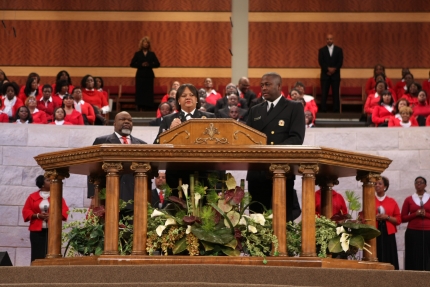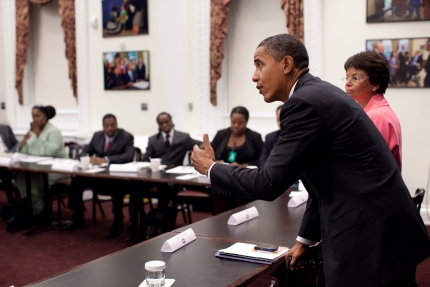Blog Posts Related to the African American Community
Faith and Communities Help Spread the Word on the Seasonal Flu Vaccine
Posted by on December 7, 2010 at 12:59 PM ESTThis week, our Center for Faith-based and Neighborhood Partnerships at HHS is promoting National Influenza Vaccination Week (“Flu Vaccine Week”) with coordinated events around the country and the release of two new Fight the Flu Resources for our faith and community-based partners.
For the first time ever, the CDC has recommended that every person 6 months and older should get the seasonal flu vaccine. To highlight the importance and safety of flu vaccination, key HHS officials spoke at diverse array of congregations and community organizations over the weekend.
Leading the launch of Flu Vaccine Week, Surgeon General Dr. Regina Benjamin spoke at the Potter’s House in Dallas, TX , pastored by Bishop TD Jakes. Speaking to the congregation, the Surgeon General thanked the congregation for their tremendous community health outreach and emphasized that need for individuals and families to get the flu shot.
The HHS Partnership Center also developed two new resources to support the efforts of community and faith-based organizations to fight flu this flu season. Faith and community leaders and members are critical partners in flu prevention. As trusted leaders and messengers, you can make sure that everyone in your community knows that an annual flu shot is the best protection against the flu—and that everyone 6 months and older should get vaccinated. The two new resources are:
• A Seasonal Influenza (Flu) Guide for Community & Faith-based Organizations & Leaders is an accessible, easy-to-read guide is written for faith and community-based leaders and organizations. The guide includes basic flu facts, everyday prevention steps, and how leaders can link folks to vaccination;
• Faith and Communities Fight Flu! is a one-page flyer that highlights five key community flu fighting steps. It can be posted on community announcement boards or in a weekly bulletin. We are encouraging faith-based and community leaders to post this flyer throughout the seasonal flu season.
And if you are reading this and have not gotten your flu shot yet, the flu vaccine locator on Flu.gov can help you find out where you can get your flu shot in your area!
Alexia Kelley is the Director of the Center for Faith-based and Neighborhood Partnerships (The Partnership Center) at the U.S. Department of Health and Human Services.
Adrienne Explains How College Students Are Benefiting from the Affordable Care Act
Posted by on October 19, 2010 at 10:24 AM ESTAdrienne Lowe, like many college students, was wondering how she was going to get health care after she graduates from college. Because of the Affordable Care Act, she now has the option of remaining on her parents’ health insurance plan. Young adults who do not have insurance through their employers may now be able to remain on their parents’ plan up to their 26th birthday. Up to 2.4 million young adults could gain coverage through this new provision.
“I graduate in May and when I graduate I was going to be dropped from my parents’ health care. Now that everything has been passed, I can still remain on my parents’ health care instead of being immediately kicked off.”
Listen to Adrienne tell her story and hear what’s happening in your state by visiting the 50 States/50 Stories map.
Learn more about , Health Care, WomenWhat Health Reform Means for African Americans
Posted by on October 13, 2010 at 9:57 AM ESTHealth care is very personal for me.
I was born with a heart murmur, my mother is a breast cancer survivor but lost her mom at the age of 3, an aunt who lost her life due to cancer, and my dad cleaned hospital rooms for 29 years. But because of having access to health care, my family’s dreams were not deferred. I am sure that I am not the only African-American who has received a second, third and fourth chance of realizing my dreams due to being healthy enough to realize them.
But for too many African-Americans, lack of access and unaffordable health care meant that their dreams were not realized.
Now, due to President Barack Obama, Health & Human Services Secretary Kathleen Sebelius and Democratic Members of Congress, health care is no longer an unmet promise for African-Americans and all Americans, it is now the law of the land.
But, you ask – how does health care help me? How does it help my family? I am glad that you asked.
Dr. Garth Graham from the Department of Health and Human Service’s Office of Minority Health has posted a new video on WhiteHouse.gov/HealthReform that discusses some of the many benefits of the Affordable Care Act for African Americans. Before the Affordable Care Act was signed into law, the African American community struggled more than most as a result of our broken health care system. As Dr. Graham points out, African Americans are nearly twice as likely to be uninsured than the rest of country and are consequently more likely to experience serious issues with medical bills and medical debt.
Learn more about Health CareWorking to Broaden and Deepen Our Online Engagement
Posted by on October 13, 2010 at 8:34 AM ESTOn Monday, the White House hosted its first African American Online Summit, which brought together a group of programming leaders from the African American online media world for an in-depth briefing and discussion about how the Administration is approaching important issues such as jobs, the economy, health care, education, community investment, civil rights and civil liberties, and the First Lady's Let's Move! initiative.
Learn more about Civil Rights, Urban PolicyFocusing HIV Prevention Efforts on Gay and Bisexual Men
Posted by on September 27, 2010 at 8:54 AM ESTToday is National Gay Men’s HIV/AIDS Awareness Day. For me, every day is an “awareness day” about HIV/AIDS. I feel it is important for me to talk about it, because I am increasingly concerned that many in the LGBT community don’t. I am worried about the kids out there and the generation that hasn’t seen the devastating impact of this epidemic the way my generation has. Now more than ever we need to be talking about HIV/AIDS. Just a few days ago The Centers for Disease Control and Prevention (CDC) published new heartbreaking data showing that one in five gay and bisexual men in 21 major US cities are living with HIV. I am one of those men. I have been living with HIV since 2001.
Learn more about Health CareFive Years After Katrina: "New Orleans is Blossoming Again"
Posted by on August 29, 2010 at 4:05 PM ESTEd. Note: Read posts from Members of the Cabinet on Katrina recovery in our "Five Years of Remembering & Rebuilding" series.
Today the President and First Lady were down in New Orleans, joined by members of the Cabinet who have been working on recovery from Hurricane Katrina since they came into office. The President spoke at Xavier University on the fifth anniversary of the disaster.
Learn more about Additional Issues

